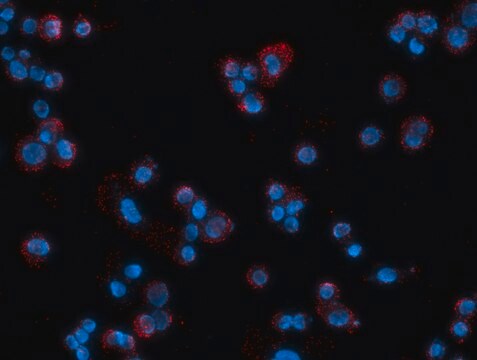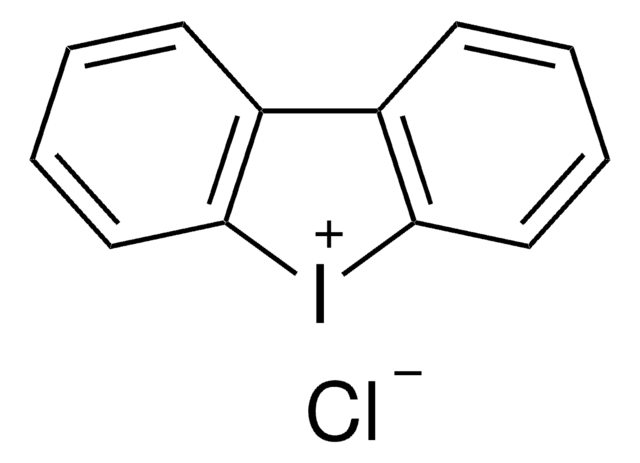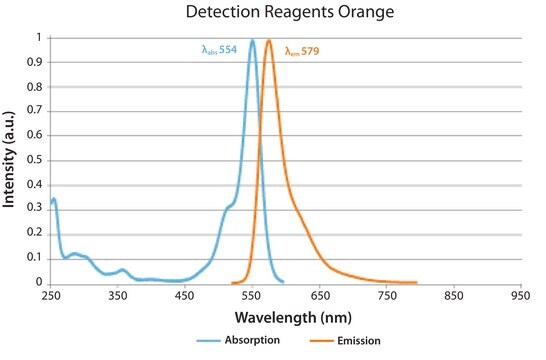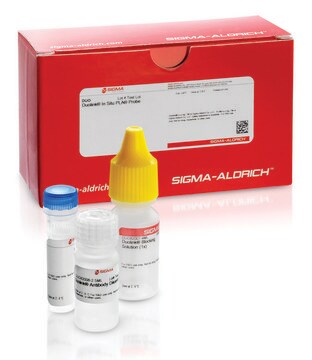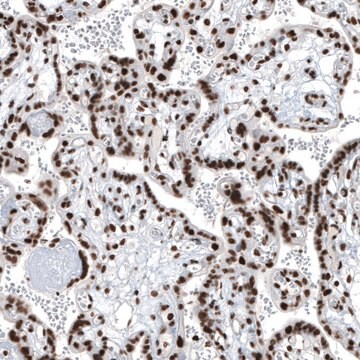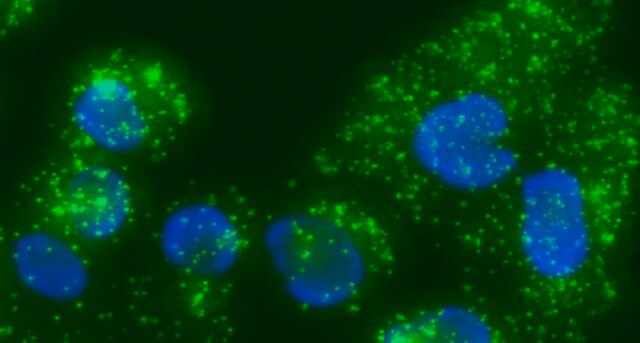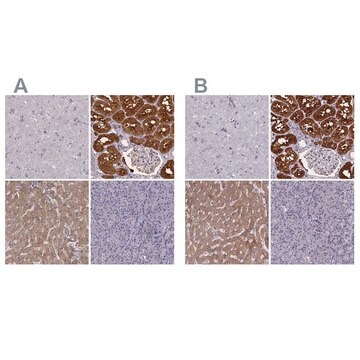推薦產品
生物源
rabbit
共軛
unconjugated
抗體表格
affinity isolated antibody
抗體產品種類
primary antibodies
無性繁殖
polyclonal
產品線
Prestige Antibodies® Powered by Atlas Antibodies
形狀
buffered aqueous glycerol solution
物種活性
human
加強驗證
independent
Learn more about Antibody Enhanced Validation
技術
immunoblotting: 0.04-0.4 μg/mL
immunofluorescence: 0.25-2 μg/mL
immunohistochemistry: 1:200-1:500
免疫原序列
EYFGEKTDPKEKIDIGLPPPKVSRTQQLLERKQAIQELRANVEEERAARLRTASVPLDAVRAEWERTCGPYHKQRL
UniProt登錄號
運輸包裝
wet ice
儲存溫度
−20°C
目標翻譯後修改
unmodified
基因資訊
human ... MRPL38(64978)
一般說明
MRPL38 (mitochondrial ribosomal protein L38) is a mitochondrial protein of the large ribosomal subunit. It is a structural subunit of the mitochondrial ribosome. In mouse model, MRPL38 is upregulated in precursor T-cell lymphoblastic lymphoma/leukemia. The gene is mapped to human chromosome 17q25.
免疫原
39S ribosomal protein L38, mitochondrial Precursor recombinant protein epitope signature tag (PrEST)
應用
Anti-MRPL38 antibody produced in rabbit, a Prestige Antibody, is developed and validated by the Human Protein Atlas (HPA) project . Each antibody is tested by immunohistochemistry against hundreds of normal and disease tissues. These images can be viewed on the Human Protein Atlas (HPA) site by clicking on the Image Gallery link. The antibodies are also tested using immunofluorescence and western blotting. To view these protocols and other useful information about Prestige Antibodies and the HPA, visit sigma.com/prestige.
特點和優勢
Prestige Antibodies® are highly characterized and extensively validated antibodies with the added benefit of all available characterization data for each target being accessible via the Human Protein Atlas portal linked just below the product name at the top of this page. The uniqueness and low cross-reactivity of the Prestige Antibodies® to other proteins are due to a thorough selection of antigen regions, affinity purification, and stringent selection. Prestige antigen controls are available for every corresponding Prestige Antibody and can be found in the linkage section.
Every Prestige Antibody is tested in the following ways:
Every Prestige Antibody is tested in the following ways:
- IHC tissue array of 44 normal human tissues and 20 of the most common cancer type tissues.
- Protein array of 364 human recombinant protein fragments.
聯結
Corresponding Antigen APREST75985
外觀
Solution in phosphate-buffered saline, pH 7.2, containing 40% glycerol and 0.02% sodium azide
法律資訊
Prestige Antibodies is a registered trademark of Merck KGaA, Darmstadt, Germany
免責聲明
Unless otherwise stated in our catalog or other company documentation accompanying the product(s), our products are intended for research use only and are not to be used for any other purpose, which includes but is not limited to, unauthorized commercial uses, in vitro diagnostic uses, ex vivo or in vivo therapeutic uses or any type of consumption or application to humans or animals.
未找到適合的產品?
試用我們的產品選擇工具.
儲存類別代碼
10 - Combustible liquids
水污染物質分類(WGK)
WGK 1
閃點(°F)
Not applicable
閃點(°C)
Not applicable
分析證明 (COA)
輸入產品批次/批號來搜索 分析證明 (COA)。在產品’s標籤上找到批次和批號,寫有 ‘Lot’或‘Batch’.。
Y-W Lin et al.
Leukemia, 21(6), 1276-1284 (2007-04-13)
We compared the gene expression pattern of thymic tumors from precursor T-cell lymphoblastic lymphoma/leukemia (pre-T LBL) that arose in transgenic mice that overexpressed SCL, LMO1 or NUP98-HOXD13 (NHD13) with that of thymocytes from normal littermates. Only two genes, Ccl8 and
Cornelia Luban et al.
Gene, 354, 72-79 (2005-05-24)
Studies of yeast, algae and plants have provided genetic and biochemical evidence that the splicing reaction of organellar localized group II introns either depends on proteins encoded by the introns themselves ('maturases') or encoded by other genes of the host
Rosita Accardi et al.
Yeast (Chichester, England), 21(7), 539-548 (2004-05-28)
Members of the YERO57c/YJGFc/UK114 protein family have been identified in bacteria and eukaryotes. The budding yeast Saccharomyces cerevisiae contains two different proteins of this family, Hmf1p and Mmf1p. We have previously shown that Mmf1p is a mitochondrial protein functionally related
Xingqian Zhang et al.
Nature structural & molecular biology, 22(5), 404-410 (2015-04-14)
In response to stress, cells attenuate global protein synthesis but permit efficient translation of mRNAs encoding heat-shock proteins (HSPs). Although decades have passed since the first description of the heat-shock response, how cells achieve translational control of HSP synthesis remains
我們的科學家團隊在所有研究領域都有豐富的經驗,包括生命科學、材料科學、化學合成、色譜、分析等.
聯絡技術服務
